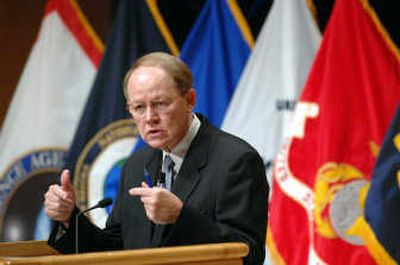Al-Qaida base rebuilt, report says

WASHINGTON – Al-Qaida has reestablished its central organization, training infrastructure and lines of global communication over the past two years, putting the United States in a “heightened threat environment” despite expanded worldwide counterterrorism efforts, according to a new intelligence estimate.
Intelligence officials attributed the al-Qaida gains primarily to establishment of a safe haven in ungoverned areas of northwestern Pakistan. Its affiliation with the Sunni insurgent group known as al-Qaida in Iraq (AQI), the report said, has helped it to “energize” extremists elsewhere and aided Osama bin Laden’s recruitment and funding.
The estimate concluded that “the U.S. Homeland will face a persistent and evolving terrorist threat over the next three years.” Al-Qaida, it said, “is and will remain” the most serious element of that threat.
The report stressed the effectiveness of counterterrorism measures, in cooperation with other countries, in disrupting terrorist networks and preventing attacks against the United States in the years immediately after Sept. 11, 2001. But it expressed concern that cooperation may wane as memories fade and perceptions of the nature and origin of the threat diverge.
The assessment was released Tuesday in a two-page declassified summary of key judgments of a National Intelligence Estimate, entitled “The Terrorist Threat to the U.S. Homeland.” The estimate mentioned a number of possible threat sources, from Hezbollah in Lebanon to self-generating radical cells in Europe and the U.S.
It was the second government report in the past week that pointed to a heightened risk from al-Qaida. The other, written by the National Counterterrorism Center, was titled “Al-Qaida Better Positioned to Strike the West.”
An NIE on global terrorism written in April, 2006 described a downward trend in al-Qaida capabilities since bin Laden and the rest of the surviving al-Qaida leadership were driven from their sanctuaries in Afghanistan by U.S. military forces in Dec., 2001. That report, like the one issued Tuesday, said that the Iraq war was a primary recruitment vehicle for al-Qaida. But the earlier report concluded that al-Qaida’s operations had been disrupted and its leadership was “seriously damaged.”
In a briefing for reporters Tuesday, senior intelligence officials said they expected al-Qaida to continue trying to “leverage” the contacts and capabilities AQI has established in Iraq. But they attributed the resurgence of bin Laden’s organization almost entirely to its protected safe haven among tribal groups in North Waziristan, part of the Federally Administered Tribal Areas (FATA) in northwestern Pakistan.
“Over the past 18 to 24 months, safe haven in Pakistan has become more secure” said Ted Gistaro, national intelligence officer for transnational threats and the primary author of the NIE. The safe haven, Gistaro said, had allowed al-Qaida to pull together a new tier of leadership in the form of “lieutenants … coming off the bench,” many of them with long experience at bin Laden’s side.
U.S. intelligence and military officials have expressed rising frustration with the government of Pakistan President Pervez Musharraf. They credit Musharraf with significantly disrupting al-Qaida havens in the FATA in 2004, with operations that led to the capture of most of bin Laden’s senior aides. Since then, however, the Pakistani military has largely stayed away from the region and last September, Musharraf formally signed an agreement with tribal leaders allowing them to police the area.
In the past week, the Bush administration has publicly declared that the agreement failed and officials Tuesday said that Musharraf had changed his policy. Director of National Intelligence Mike McConnell said Tuesday that Musharraf was “moving forces, again, into that region to put pressure on al-Qaida.”
In separate remarks to an intelligence conference Tuesday, McConnell painted a picture of al-Qaida activities and the threat to the United States that went beyond the NIE judgments. “They’re working as hard as they can in positioning trained operatives here in the United States …They have recruitment programs to bring recruits into … Pakistan, particularly those that speak the right language, that have the right skills, that have the right base that they could come to the United States, fit into the population…and carry out acts.”